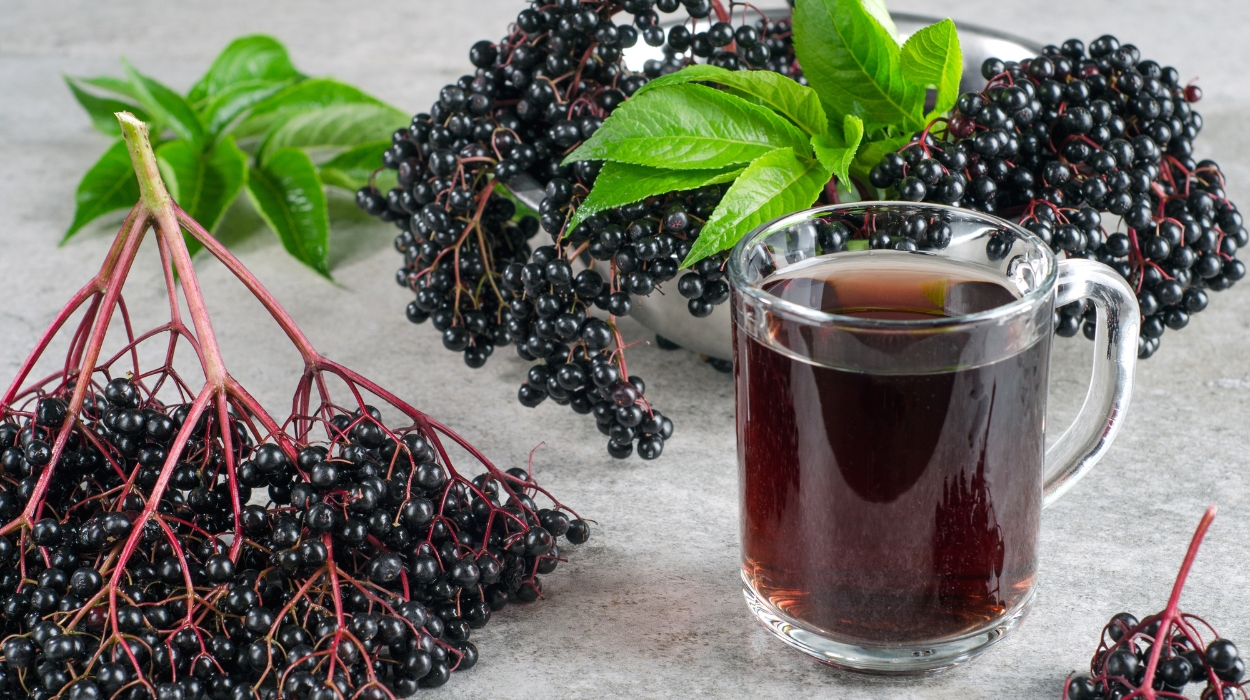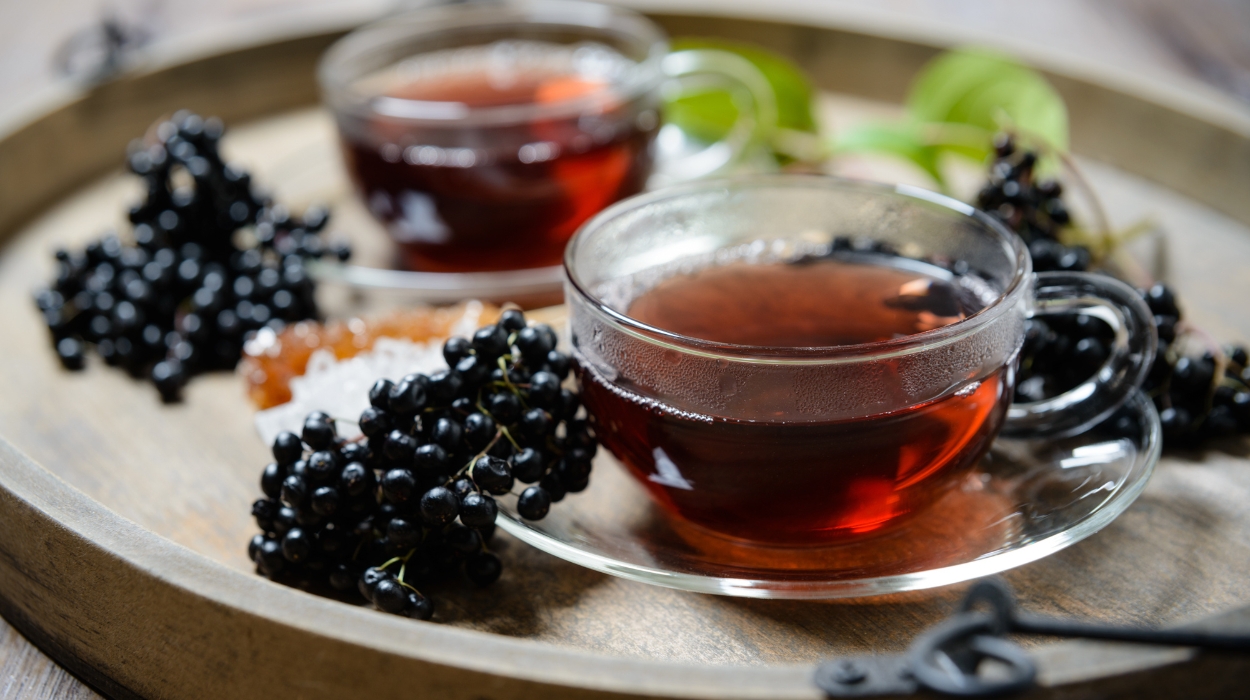Drinking tea every day is a healthy habit that may protect you[1] from a wide range of medical conditions. The health benefits of black tea are well established, but fewer people know about the advantages of drinking elderberry tea.
Elderberry, or Sambucus nigra, is the fruit of a flowering tree native to Europe and North America. The dark purple berries contain several bioactive compounds and have long been used for their medicinal properties. Raw elderberries aren’t safe to eat but, when brewed into tea from dried, ripe elderberries, they have a wide range of potential health benefits[2] including antibacterial, antiviral, and antitumor effects.
Read on to learn how elderberry tea benefits your health, and how to use elderberry tea to stay healthy throughout cold and flu season.
Health Benefits Of Elderberry Tea
- Natural remedy for cold and flu.
- Improves cardiovascular health.
- Reduces the risk of cancer.
- Reduces inflammation.
- Improves digestive health.
Benefits Of Elderberry Tea

The health benefits of green tea and black tea are well known, but fewer people are aware of the invigorating properties of elderberry tea which has a sweet, but tart taste.
Elderberry fruit, leaves, and flowers have been used in folk medicine since around 400 BC,[3] primarily as a natural treatment for respiratory illnesses. Elderberry is still used today as a remedy for easing cold symptoms, and regularly drinking elderberry tea could have a variety of other health benefits.
Natural Remedy For Cold And Flu
One of the main medicinal uses for elderberry tea is as a natural remedy for respiratory infections[3] like cold and flu symptoms. This is because elderberry has antiviral properties that can inhibit the spread of viruses within the body.
Cold and flu viruses use specialized proteins, called attachment proteins, to bind and enter[4] cells in the respiratory tract. Once inside a host cell, the virus can replicate to produce new viruses, which subsequently spread to other cells.
Bioactive compounds in elderberry block the function[5] of viral attachment proteins, effectively deactivating the virus. This prevents the virus from binding to and entering host cells and stops the infection from spreading. As a result, elderberry can significantly reduce[6] the severity and duration of cold and flu symptoms including coughing, sneezing, and sore throat.
Elderberry may also help you fight off flu viruses by boosting immune function. Elderberry extract can stimulate immune cells[7] called T cells, which play a key role in clearing viral infections. Using elderberry tea to kick your immune system into gear could help your body eliminate influenza viruses and get you back to full health more quickly.
Therefore, using elderberry supplements or drinking elderberry tea during cold and flu season could offer you some protection against sickness. Elderberry may be good for immune health and has antiviral properties, making it a natural remedy for cold and flu symptoms.
Improves Cardiovascular Health
Drinking elderberry tea may help improve your cardiovascular health by increasing your intake of heart-friendly polyphenols.[8]
Elderberries are rich in polyphenols, which are naturally occurring compounds found in plants. The most abundant polyphenols[9] in elderberries are called anthocyanins. Anthocyanins have numerous health-promoting properties, largely due to their strong antioxidant capabilities.
Antioxidants can boost heart health by mitigating oxidative stress in the heart and blood vessels. Oxidative stress is caused by an accumulation of reactive oxygen species; oxygen-containing molecules that can damage cells in all parts of your body. Oxidative stress in the cardiovascular system can negatively impact the structure and function[10] of heart tissue, eventually leading to heart disease, heart attack, stroke, and heart failure.
Including more polyphenols in your diet might boost cardiovascular health by reducing oxidative stress[11] in your heart and blood vessels. Therefore, regularly drinking elderberry tea or taking elderberry extract could help keep your heart and blood vessels healthy.
Elderberry tea may also improve cardiovascular health by helping to reduce your cholesterol levels.[12]
High cholesterol can contribute[13] to the formation of fatty plaques inside major arteries. Arteries are the blood vessels that carry oxygenated blood from the heart to the entire body. The build-up of plaques inside arteries, called atherosclerosis, is the leading cause[14] of heart disease and may cause heart attacks, stroke, and peripheral artery disease.
Anthocyanins in elderberry tea give it a characteristic black-purple color and may help lower cholesterol levels and keep your arteries clear and functional. Mice fed elderberry extract had lower cholesterol levels[15] and, most importantly, less cholesterol in their major arter. This suggests that regular elderberry intake could help preserve arterial health and, therefore, reduce your risk of heart problems.
Reduces Risk Of Cancer
Besides being good for your heart, the antioxidant properties of elderberry tea as demonstrated by in vitro studies[16] may also help reduce your risk of cancer.
Oxidative stress[17] plays a known role in cancer development, as many cancers are thought to arise from DNA damage caused by reactive oxygen species. Antioxidants neutralize reactive oxygen species and prevent them from causing damage,[18] so eating an antioxidant-rich diet may reduce your cancer risk.
As a rich source of antioxidant anthocyanins, elderberry has anti-cancer properties[19] that could help keep you healthy. Elderberry extract was found to inhibit the growth[20] of various types of cancer cells, suggesting potential uses in the treatment of cancer. Therefore, drinking elderberry tea every day could alleviate damage caused by reactive oxygen species and help safeguard your long-term health.
Reduces Inflammation
Elderberries contain a high concentration of anti-inflammatory compounds[21] which could reduce your risk of many inflammation-related medical conditions.
Acute inflammation is an immune response triggered by[22] injuries or exposure to pathogens, allergens, or toxic compounds. This is your body’s natural response to injury or infection and is a normal part of the healing process.
However, uncontrolled inflammation can become chronic and lead to tissue damage and disease. Chronic inflammation is thought to contribute to more than half of all deaths[23] worldwide and is a risk factor for rheumatoid arthritis, heart disease, gastrointestinal disorders, lung diseases, mental illnesses, diabetes, neurodegenerative diseases, and some cancers.
The anti-inflammatory properties of elderberry tea may regulate or even prevent inflammation.[24] This means that regularly consuming elderberry products could reduce your risk[25] of diseases associated with chronic inflammation.
Improves Digestive Health
Black elderberry has laxative properties[2] and is a traditional natural remedy for constipation. It may also have prebiotic effects, meaning it could promote the growth of healthy gut bacteria. Prebiotics could improve the diversity of your gut microbiome — that is, the total population of microorganisms in your intestines — which is key for maintaining digestive health.[26]
People who used elderberry supplementation for 9 weeks in one study had a significant improvement[27] in the diversity of their gut microbiome. This suggests that elderberry tea could function as a digestive supplement, helping to promote a healthy gut microbiome and prevent gastrointestinal issues.
Other gut health drinks containing fruit and vegetable supplements may also improve your digestive health and help alleviate issues like constipation and diarrhea.
What Does Elderberry Tea Taste Like?

Elderberry tea is made from dried elderberries and has a deep purple color. It has a sweet and slightly tart taste, with earthy undertones and a floral aroma. Many people enjoy the rich, complex taste of pure elderberry tea, but you can change things up with a variety of spices and sweeteners.
Elderberry pairs well with warm, slightly spicy flavors like cinnamon, turmeric, and ginger. You could also use cardamom to bring out the floral scent of elderberry and add fragrance to your herbal tea. To enhance the fruity taste of elderberry, add orange rind or a few drops of lemon juice to your brew.
If you prefer your tea sweet, let it cool slightly before stirring in some honey, agave, or maple syrup.
Elderberry syrup is also made from elderberries and has the same healthful properties as the tea, but it has a far sweeter flavor. You can use elderberry syrup for its health benefits, but be mindful of the high sugar content as too many grams of sugar per day can lead to weight gain.
How To Make Elderberry Tea
The easiest way to make elderberry tea is by using elderberry tea packs. These are sachets of dried berries, often blended with other herbal ingredients, and can be prepared with the simple addition of hot water.
You can also make fresh elderberry tea at home using water and dried elderberries, which can be purchased from supermarkets and health food stores. You may be tempted to forage for fresh berries but uncooked, unripe elderberries contain toxins[28] that can cause nausea, vomiting, and diarrhea. Therefore, it’s better to purchase your berries from a reputable store, as these will be cooked and made safe during processing.
The amount of berries used to make elderberry tea depends on how strong you like your brew, but we recommend starting with one tablespoon of berries per cup of water. You can adjust this amount to make your tea more or less strong.
Once you have added your berries to the water, heat the combination on the stove until boiling. Next, reduce the heat and simmer for around 15 minutes. You’ll know your tea is ready when it takes on a dark purple color and a rich elderberry scent.
If you want to add spices to your tea like a cinnamon stick, ginger, orange peel, or turmeric, add this at the beginning of the cooking process. Simmering the spices along with your berries will allow the flavors to properly infuse your tea.
Elderberry Tea Side Effects
You can drink elderberry tea every day without side effects. However, it is not safe to eat raw elderberries.
This is because elderberries contain two harmful compounds called sambunigrin and prunasin,[2] which are converted to hydrogen cyanide during digestion. This can lead to acute cyanide poisoning with symptoms including[29] rapid breathing and pulse, a drop in blood pressure, dizziness, vomiting, diarrhea, confusion, twitching, and convulsions.
Elderberries are only safe to consume once they have been cooked. If you want to try elderberries or elderberry tea, shop for dried elderberries in your local health food store or supermarket.
Conclusion
Berries are some of the healthiest fruits in the world, and the benefits of berries are largely due to their antioxidant compounds. The fruits of the elderberry tree are an abundant source of anthocyanins, which are polyphenols with potent antioxidant and anti-inflammatory effects.
The healing properties of elderberry tea are well-established. For millennia, this medicinal plant has been used as a natural flu remedy and to ease gastrointestinal issues. Modern research has also found that elderberries may boost the immune system, improve cardiovascular health, and reduce your risk of various medical conditions.
Frequently Asked Questions
Elderberry tea has antiviral properties that can help reduce the severity and duration of flu symptoms. It may also improve cardiovascular health, improve digestive function, and reduce your risk of cancer and other diseases.
The safety of elderberry tea for pregnant and breastfeeding women has not yet been established. Therefore, it’s advisable to avoid elderberry as a cold or flu treatment if you’re pregnant or breastfeeding.
Herbal teas, like elderberry tea, don’t contain caffeine. This makes them a good choice for your bedtime drink, as they won’t keep you awake at night.
Some people like to drink elderberry tea in the evening, as warm, caffeine-free drinks can be soothing around bedtime. However, the health benefits of elderberry are not enhanced or diminished by drinking it at specific times of the day.
 Evidence Based
Evidence Based
